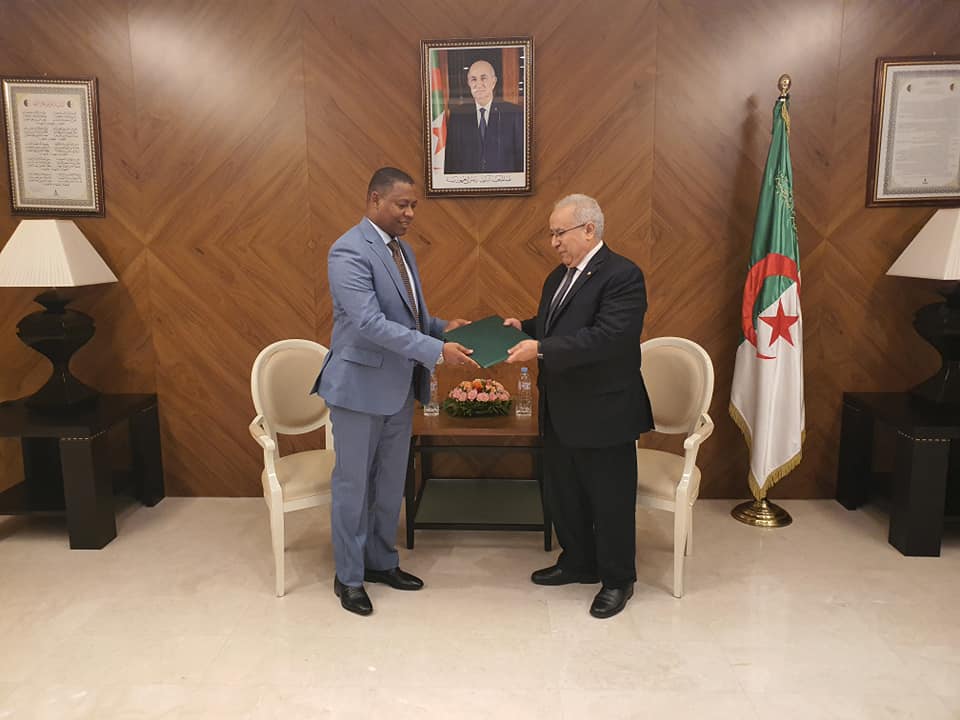NATIONAL SECURITY ISSUES
-
Libyan authorities said Saturday, August 13, they found at least 15 migrants dead in the desert on the borders with Sudan, the latest tragedy involving migrants seeking a better life in Europe via perilous journeys through the conflict-wrecked nation. The Department for Combating Irregular Migration in the southeastern city of Kufra said the migrants were on their way from Sudan to Libya when their vehicle broke down due to lack of fuel. The agency said nine other migrants survived while two remain missing in the desert. There were women and children among the migrants, but the agency did not elaborate on how many. It also did not reveal causes of the migrants’ death, but said they did not have enough food and water. It said the migrants were all Sudanese — from a country in turmoil for years. The migrants likely attempted to reach western Libya in efforts to board trafficking boats to Europe.
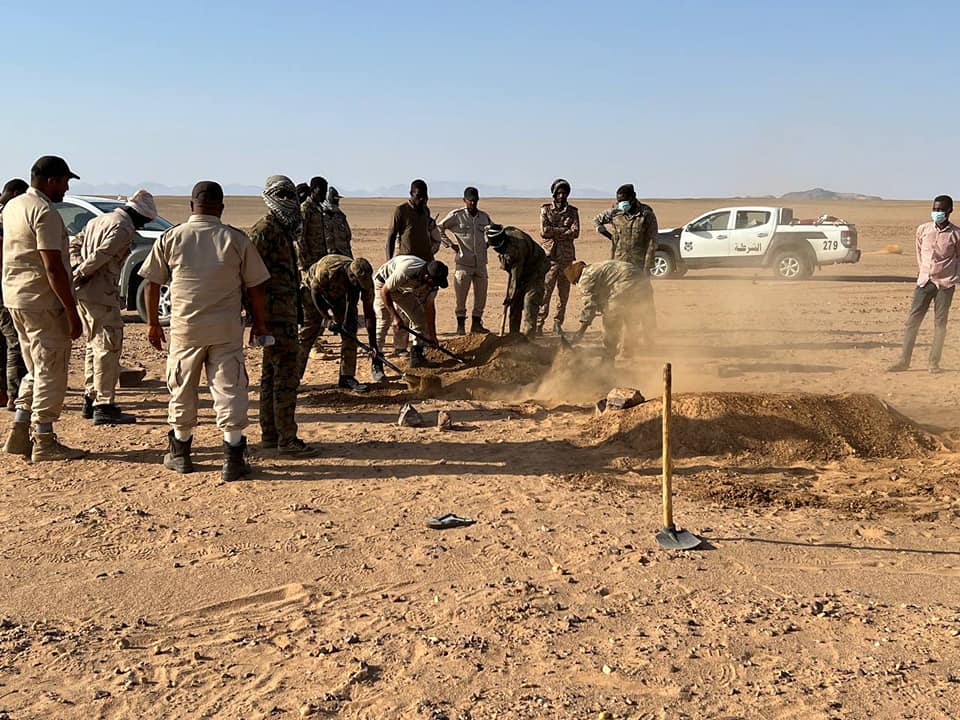
- The Acting Head of the U.N. Support Mission in Libya (UNSMIL), Raisedon Zenenga met 10 August with Tripoli-based Chief of Staff Lieutenant General Mohamed Al-Haddad, to discuss “the latest security developments in Tripoli and adjacent areas as well as the progress on the military and security track,” UNSMIL revealed. According to the Mission, Zenenga commended Al-Hadda’s “contributions to defuse and de-escalate tensions in the capital and western region.” “He also welcomed the steps being taken towards unification of military institutions, most recently through talks between the two Military Commanders on 18-19 July in Tripoli,” UNSMIL concluded.
-
Tripoli Coast Guard has intercepted 330 migrants on board two boats at sea on their way to Europe. On one of its operations, “the Guard rescued 214 migrants, including 11 women and 4 children of Arab and African nationalities,” Interior Ministry said in a statement on Wednesday, August 10. “It also rescued 116 migrants of different nationalities on another boat,” according to the Ministry’s statement. The migrants were transferred to the disembarkation point at the Port of Tripoli, in the presence of representatives of the International Organization for Migration (IOM), and were handed over to the Anti-Illegal Migration Agency, it added.
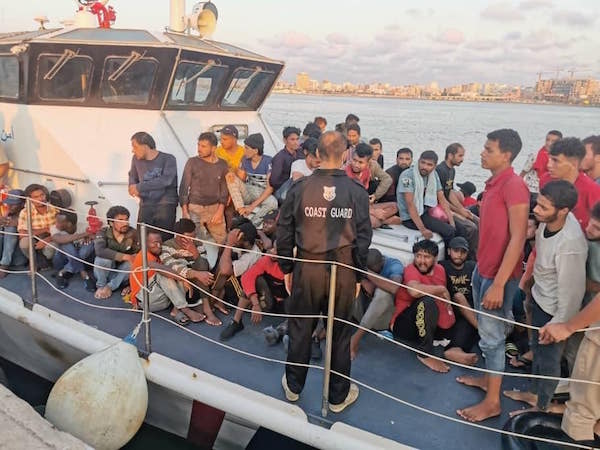
- 116 migrants have been disembarked back on Libyan shores in the period from 31 July to August 6, 2022, according to International Organization for Migration. So far in 2022, 12,063 migrants have been disembarked on Libyan shores, IOM said on Tuesday, August 9. It added that 195 migrants died and 710 went missing in the period from 1 Jan to 6 August, 2022 on the Central Mediterranean route. In 2021, 32,425 migrants were disembarked on Libyan shores, while 662 died and 891 went missing, the Organization added.
- 56 migrants, on a 10-meter boat that left Zawia in Libya, were rescued, about 3 miles from the coast of Lampedusa, by Italy’s Guardia di Finanza, according to Italian news agency Ansa. The group, most of whom are Egyptians, was transferred a “hotspot” in Lampedusa where there were 455 migrants are located, Ansa reports.
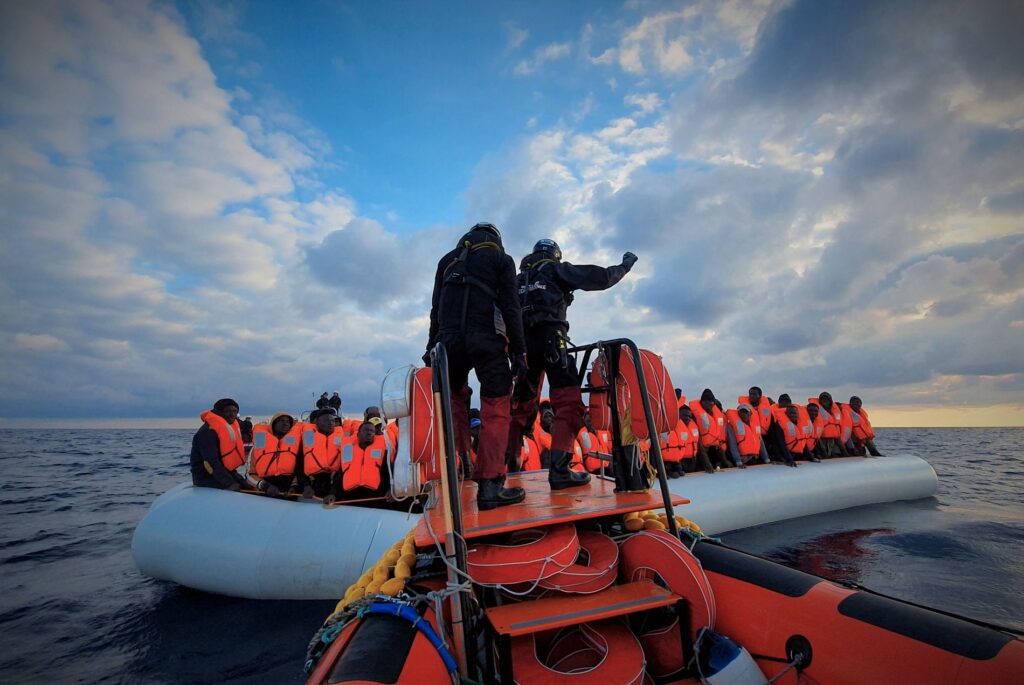
- A session for the trial of 56 people accused of fighting in the ranks of ISIS organization was held in Misrata, Libya on Monday, August 08. The session was held by the Misurata Court of Appeal at the Anti-Crime Agency Headquarters east of the city, in the presence of the families of the victims of the organization, according to press sources. The defendants had been arrested during the “Al-Bunyan Al-Marsous” military operation against ISIS that took place in Sirte in 2016, according to the sources. The court decided to adjourn the hearing to 25 September.
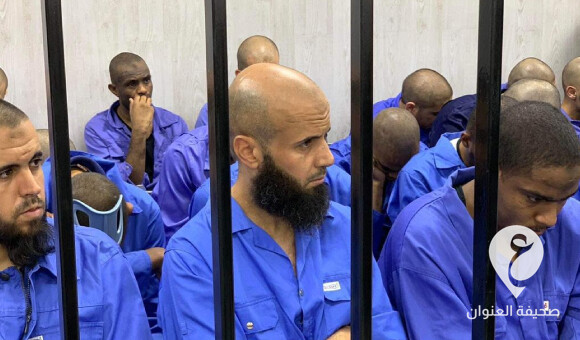
- There were more militia clashes Friday night, August 5, on the outskirts of Tripoli as the battle for who has the legitimacy to be Libya’s prime minister continues. Militias aligned to Osama Juwaily, who is politically aligned to the House of Representatives’ selected prime minister, Fathi Bashagha, against the National Mobile Force thought to be in favour of the status quo. On another more dangerous level, the Juwaily-aligned forces are deemed to represent the ethnically Arab Zintani whilst the National Mobile Force is deemed as representing the ethnically Amazigh Libyans. The clashes involved the Juwaily aligned forces entering and temporarily occupying barracks in and around the Islamic Call Society headquarters at the Al-Jibs checkpoint off Swani Road. The clashes were short-lived and ended on Friday night.
-
The founder of a far-right Italian party and frontrunner to be the country’s next leader has called for a blockade of Libya to stop migrants crossing the Mediterranean, according to British newspaper the Daily Mail. Giorgia Meloni, leader of the Brothers of Italy party, wants the Italian navy to blockade the north African coast so that all migrants can be screened before leaving to ascertain whether they are genuine refugees. Those who can prove their refugee status should be allowed through, Meloni said, while those who cannot should be sent home.
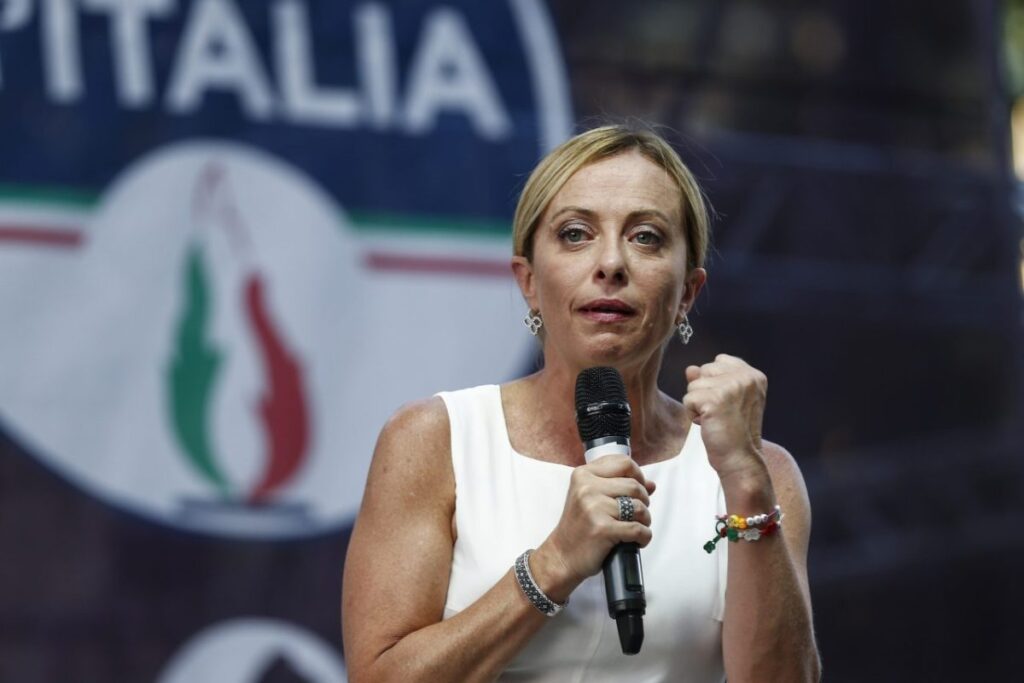
NATIONAL POLITICS AND SOCIAL ISSUES
- Spokesman of the Libyan National Army (LNA), Major General Ahmed al-Mismari, said that LNA forces are not a party to any political conflict in the country, and do not support one party at the expense of the other. Al-Mismari warned in statements to the Emirati newspaper Al-Ittihad that the political crisis in Libya affects the work of the armed forces, especially in their battle against terrorism. LNA Spokesman pointed out that the main task of the Libyan army forces is to fight terrorism and preserve the security and stability of the country.
- Prime Minister-designate Fathi Bashagha met on Friday night (August 12) with a delegation of social and tribal leaders from the city of Zliten, 160 km to the east of Tripoli. According to a brief statement by his government, Bashagha reportedly discussed with the delegates his efforts to assume office in the capital. The 59-year-old was selected as premier by parliament in February this year. However, the incumbent rival Abdul Hamid Dbeibeh rejected the parliament’s decision, claiming that he will only relinquish power after national elections. After several abortive attempts to enter Tripoli, all of which led military confrontations, Bashagha decided to settle his government in Sirte in order to “avoid bloodshed”.
- The United Nations urged political leaders in Libya on Friday to “put in place practical mechanisms for youth inclusion in the decision-making process”. In a statement commemorating International Youth Day, the U.N. Support Mission in Libya (UNSMIL) pointed out that “youth in Libya are at the center of the protracted crisis and are among those most critically impacted by it.” It also highlighted that young people in the country have expressed “unprecedented interest in public and political affairs and are actively contributing to building a freer, more socially just and democratic society.”
- Field Marshal Khalifa Haftar, commander of the Libyan National Army (LNA), attends funeral of Sheikh Al-Basha Saleh Al-Atyush, a leading figure of Al-Moghrabi tribe from eastern Libya, who passed away on Wednesday, according to LNA’s media office. Sheikh Al-Atyush died due to a health problem in the city of Benghazi. Al-Atyush is considered one of the most important social leaders in Libya, especially in the oil crescent region, where the Al-Moghrabi tribe, to which the deceased belonged, extends.
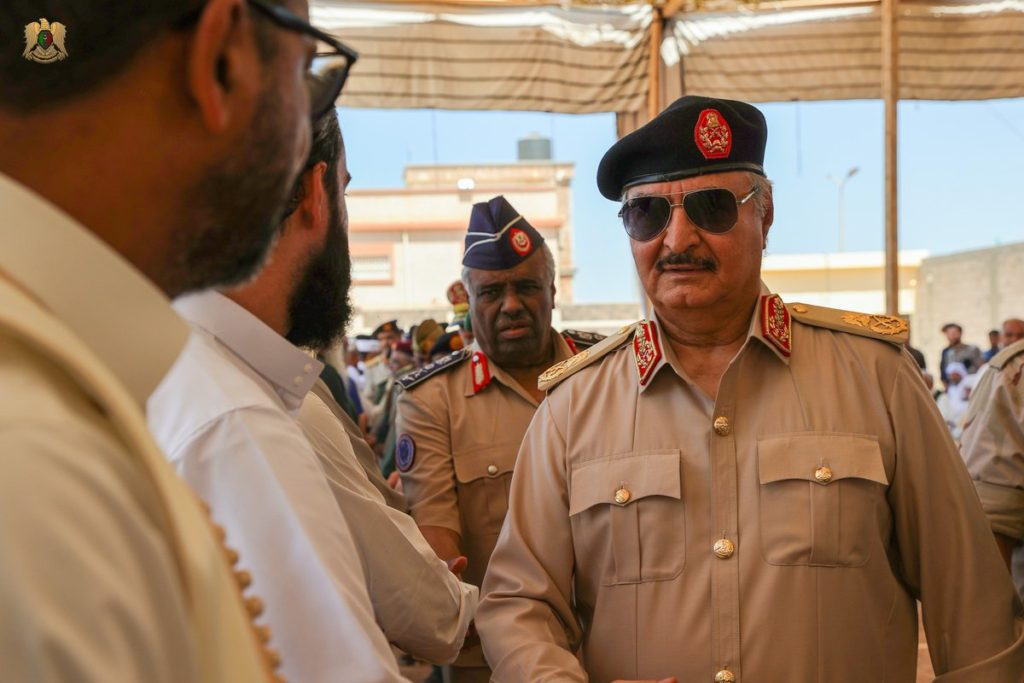
- Spokesman of the Libyan National Army (LNA), Major General Ahmed al-Mismari, said that LNA forces are not a party to any political conflict in the country, and do not support one party at the expense of the otherAl-Mismari warned in statements to the Emirati newspaper Al-Ittihad that the political crisis in Libya affects the work of the armed forces, especially in their battle against terrorism. LNA Spokesman pointed out that the main task of the Libyan army forces is to fight terrorism and preserve the security and stability of the country. He affirmed that the Libyan military is capable of unifying its national institution, but the interventions carried out by some political and extremist entities represented by “the terrorist Muslim Brotherhood Group” are trying to abort those efforts to bury the idea of a Libyan army bearing a national character and protecting the flag of the nation, adding: “Therefore, they intensify their efforts to obstruct all efforts which aims to unify the Libyan military establishment.”
-
President of the Tripoli-based High Council of State (HCS), Khaled al-Mishri, has discussed with the UN Under-Secretary-General for Political and Peace-building Affairs, Rosemary DiCarlo, the political developments in Libya. This came during a phone call he received on Tuesday, said HCS Information Office on Wednesday. Al-Mishri explained HCS’ position on the country’s political crisis and its vision to get out of it by organizing elections on sound constitutional and legal bases that would renew the country’s political legitimacy and end the transitional periods.
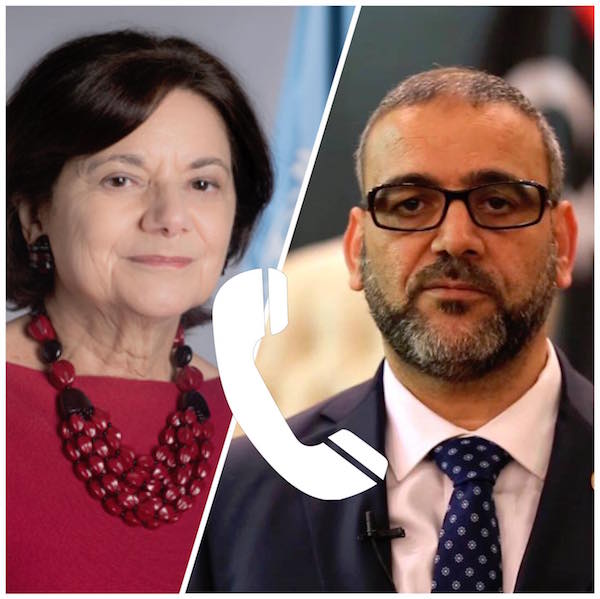
- Fathi Bashagha, the Libyan prime minister designated by parliament, commemorated on Tuesday, August 9, the 82nd anniversary of founding the Libyan army. “I extend my warmest congratulations to the officers, non-commissioned officers and soldiers loyal to the homeland and defenders of its independence and sovereignty,” Bashagha said via Twitter. He affirmed his support for “all endeavors aimed at unifying the Libyan army and benefiting from international expertise; to achieve its development and rehabilitation of its members and to guarantee the principle of national sovereignty.”
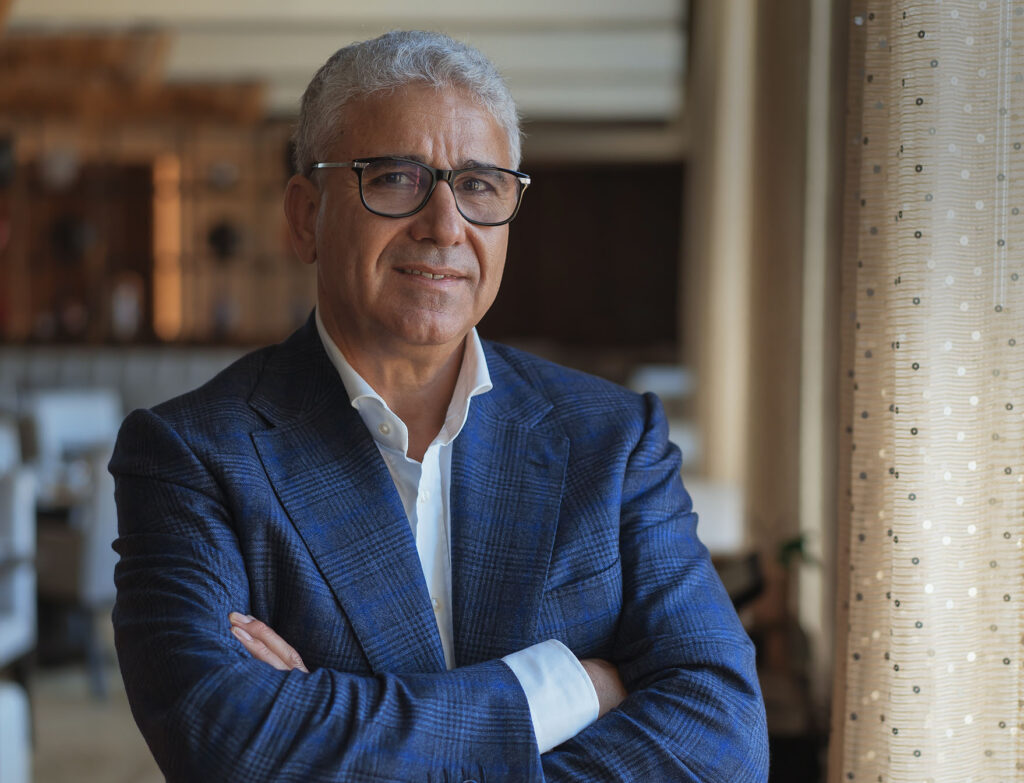
- Acting Head of UN Support Mission in Libya (UNSMIL) Raisedon Zenenga met Libyan Presidential Council (PC) Vice President Abdallah Al Lafi Monday, August 8, where they discussed developments in Libya, including efforts to find a pathway to national elections as soon as possible and to resolve the political stalemate. They also discussed the security situation in and around Tripoli and the imperative to de-escalate tensions and protect the population, according to UNSMIL. Zenenga relayed to Al Lafi his appreciation for the role of the Presidential Council in maintaining momentum on the political process and for its efforts to resolve outstanding issues on the constitutional track, UNSMIL said in a statement.
INTERNATIONAL RELATIONS
- The Chief of the General Staff in Tripoli, Lieutenant-General Mohamed Al-Haddad, met with a delegation from the British Ministry of Defense, represented by the Head of Security Policies for South America, Africa and the Middle and Far East at the British Ministry of Defense. According to a statement by the Tripoli-based General Staff, meeting was attended by the British ambassador, Caroline Hurndall, and the military attache of the British Ministry of Defense to Libya. The delegation reportedly affirmed its support to the Libyan army, and that “the United Kingdom would have a role in unifying the Libyan military institution.” As per the statement, the delegation discussed ways of joint cooperation between Libya and Britain in combating terrorism, and providing training experience to the naval forces.
- The U.S. Special Envoy and Ambassador to Libya, Richard Norland, paid tribute on Thursday to Sheikh Al-Basha Saleh Al-Atyush, a leading figure of Al-Mghrabi tribe from eastern Libya, who passed away yesterday (Wednesday, August 10). “We honor his contributions supporting peace, unity, and reconciliation in Libya,” Norland was quoted as saying by the U.S. Embassy in Libya via Twitter. The American diplomat offered his condolences to Al-Atyush’s family and loved ones.
- The consulate general of Turkey in the city of Benghazi will return to provide services if conditions in the eastern region make it possible, Turkish Ambassador to Libya, Kenan Yilmaz, said on Wednesday, August 10. Yilmaz made his remarks to his country’s state-owned news agency Anadolu on the sidelines of his participation in the 13th ambassadorial conference in Ankara. According to the Turkish diplomat, there are important opportunities to develop relations between Turkey and Libya in various sectors such as trade, economy, investment, culture, health and safety and the parties are continuing to work to strengthen bilateral relations, in collaboration with a ” strong government that holds power in Libya ”.
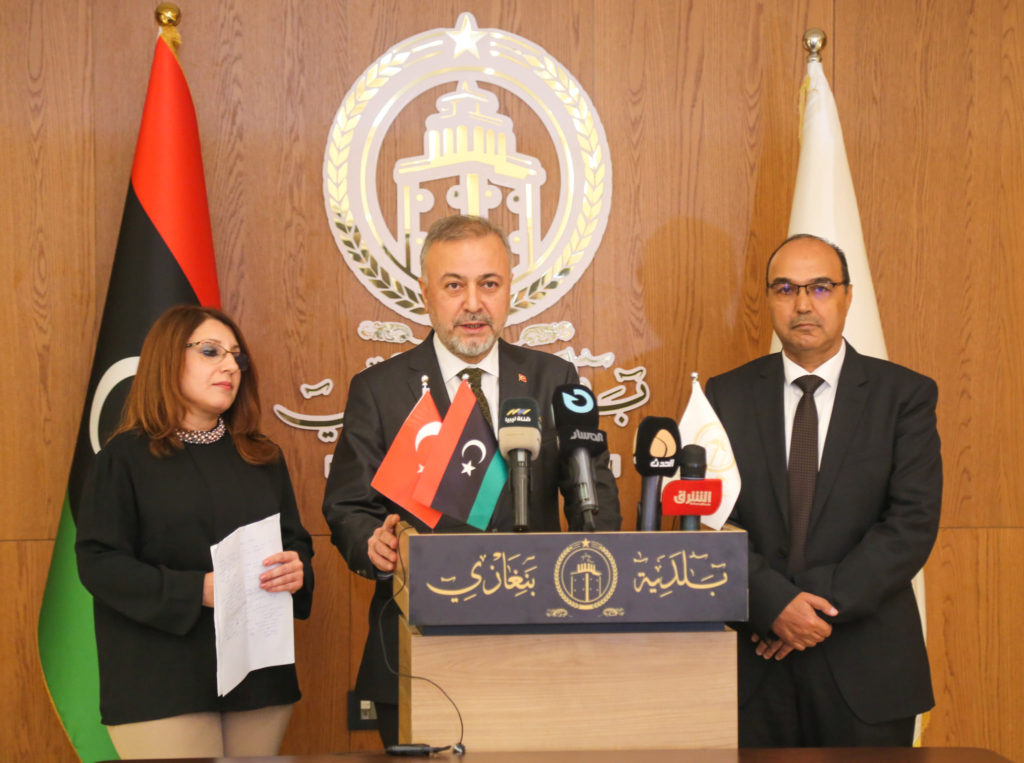
- Military officers from western and eastern Libya will convene a meeting Sirte soon as part of their work in the 5+5 Joint Military Committee, Libyan TV Channel Al-Masar reported. Citing the channel’s own correspondent in Sirte, Al-Masar said representatives of the U.N. Support Mission in Libya (UNSMIL) and Libyan ceasefire monitors will also attend the upcoming meeting. However, it also noted that Chief of Staff of western Libya forces, Mohamed Al-Haddad and his counterpart at the Libyan National Amy (LNA), Abdul Razzaq Al-Nadori, will not participate this time after their last meeting in Tripoli on July 19. Al-Masar did not report on the exact date of the anticipated gathering.
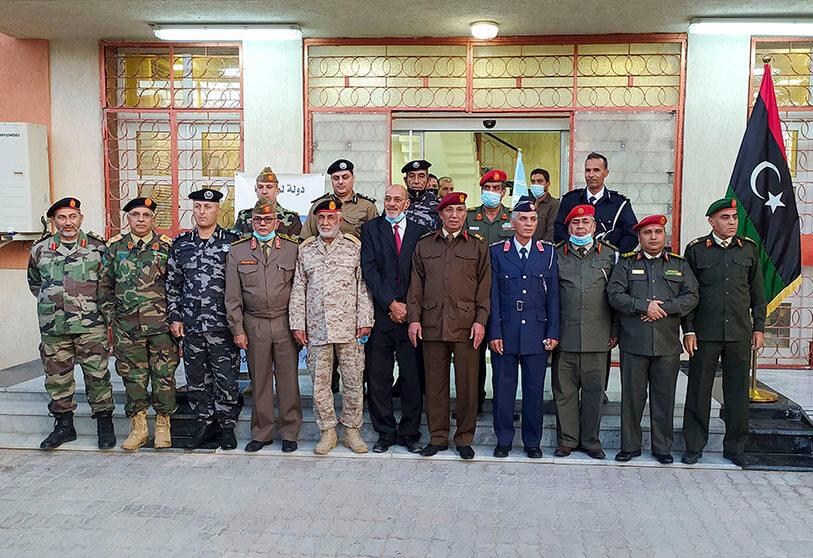
- Libya’s new ambassador to Algeria, Saleh Himma, presented on Monday, August 8, his credentials to Algerian Foreign Minister Ramtane Lamamra, according to a statement by Algerian foreign ministry. During the meeting, both diplomats discussed the “relations and and cooperation between the two countries and peoples,” as per the ministry’s statement. They also discussed “the latest developments in the political and security situation in Libya, stressing the need to redouble and coordinate efforts to achieve the goal of building democratic institutions in light of a comprehensive Libyan reconciliation that ends differences and achieves security and stability”.
- Acting Head of UN Support Mission in Libya (UNSMIL) Raisedon Zenenga met Monday with High Council of State (HCS) member and former President Abdurrahman Sewehli and exchanged views on ongoing efforts to resolve the political stalemate, maintain calm and defuse escalating tensions in and around Tripoli, according to UNSMIL. They both stressed the imperative to put the electoral process back on track and noted that there can be no military solution to any aspect of the current political stalemate, UNSMIL said in a statement.
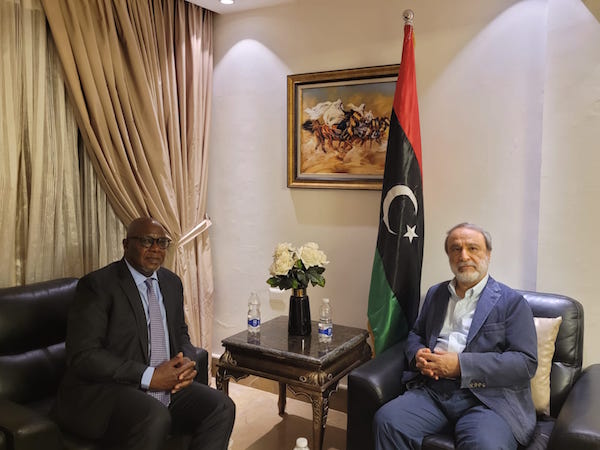
- The Mayor of Benghazi Saqr Bjwari held talks on Monday, August 08, with Ambassador to the Netherlands, Dolf Hogewoning, in at the city’s municipal council. According to Hogewoning, the two held “constructive discussion on reconstruction of the city and economic opportunities”. “The support to municipal councils nationwide is essential, as real democracy begins at grass roots,” he added.
